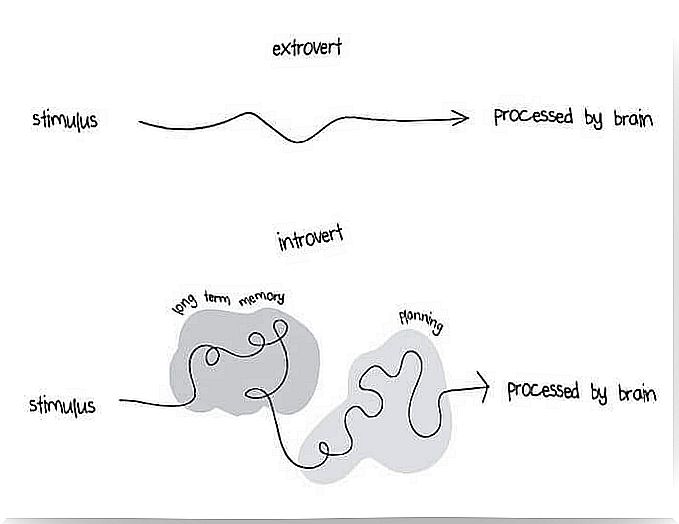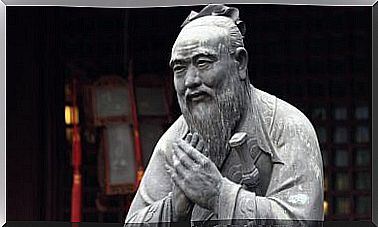Silent People Have The Most Interesting Minds

Silent people usually go unnoticed. What is hidden behind this serene, cautious and silent aspect is rarely taken into account. They are observers, explorers of the senses, who connect more intensely with reality, with small details and with those sensitive worlds that hide various and exciting universes.
We all process information differently, we already know this. However, sometimes it escapes us that these differences are mainly related to our personality. According to Marti Olsen Laney, author of The Introvert Advantage, taciturn people, who match an introverted profile, analyze information in a more paused, more meticulous and profound way.
This happens for a precise and fascinating reason at the same time. Each stimulus in the brain of the introverted person follows a complex path linked to emotional memory, analysis and planning. The more extroverted people, on the other hand, have a lower sensitivity threshold to stimuli and are much faster in emitting a response or initiating a conduct.
It is all about exalting one personality above the other. In fact, most of us can have characteristics of both dimensions, even if we are closer to one of the two. What we mean is that today this silence typical of the introverted person continues to be misinterpreted and even excluded in educational centers.
We tell you about it.

Silent people: rare creatures in a world of extroverts
Every day teachers and professors see pupils in the classrooms who, sitting in the back row, spend the whole lesson in silence, absorbed in one place in the classroom or scribbling in their notebooks. They don’t like answering questions out loud or interacting. They don’t “work” that way. However, schools, and even universities, continue to value the pupil who participates, who talks, who raises his hand and who infects enthusiasm and interest with his attitude.
This stereotype that links extroversion to success or effectiveness is still deeply rooted in our minds and in our society. Specialists in social psychology, for example, tell us that in recent decades the profile of the outgoing person, charismatic and at the same time self-centered and not very sensitive to the needs of others continues to rise very strongly in our workplaces and in our political elites.
It is as if the collective ideal valued these behavioral and personal characteristics as effective, without being able to really see the productive commitment or the ability to create a climate of harmony in the work groups. However, and here comes the most contradictory aspect, current leadership research reveals that introverted, taciturn, thoughtful and patient people guarantee a much higher performance and a more satisfying human environment.

On the other hand, Harvard University professor and researcher Francesca Gino did a work in which it was shown that leaders with an introverted personality do not abound nowadays. They are rare creatures in a world where extroversion continues to triumph. However, being able to count on a leader with a paused, thoughtful and at the same time sensitive style is of great help in order to strengthen the attitudes of the workers.
Silent people and their minds
Silent people aren’t necessarily shy. They are paused, they have another rhythm, other times and other needs. For them, the world sometimes goes too fast and they can’t analyze every aspect, every detail how they want. Because every nuance of their reality must first pass through the filter of emotions and, this delicacy, this meticulousness has its own task, its own language, its own ability.
Silent people are not comfortable in the center of attention. They are not anyone’s satellite and prefer to orbit in private, sometimes even solitary spaces. This behavioral style can arouse a certain amazement in the eyes of others, as a result many times the most silent people are labeled as shy, clumsy, reserved or disinterested. However, it is important to know that these people hide their treasures and beauties in the depths of their soul, and that is where their immeasurable beauty lies.
Let’s now see in detail what their characteristics are

The 5 characteristics of silent and introverted people
First of all, it is important to underline the abundant bibliography that exists on this topic. Books like The Introverted Leader: Building on Your Quiet Strength by Jennifer B. Kahnweiler are interesting examples with which to expand our knowledge about these people.
However, and broadly speaking, below we present some fundamental characteristics of the mind of the most reserved, most taciturn people:
- They think before they speak. They are cautious in communicating, they know how to listen, reflect and then respond.
- They don’t like superficiality. Their interest navigates the depths of reality, they are imaginative, they like to relate ideas and concepts, they are dreamers and usually talk to themselves all the time.
- Silent people usually have good self-esteem. They do not get carried away by the opinions of others, they have solid personal values and clear ideas.
- They prefer to write rather than speak. They feel more comfortable with written words.
Finally, as we indicated earlier, loneliness is a common refuge in the introverted person. However, it must be emphasized that it does not seek it as an escape mechanism, but as a space to recover energy and clarity when the world saturates it with its stimuli, its voices, its haste and its noises.
Because after all, silent people are accomplices of the wisdom that comes from reflection, imagination and, above all, quiet silence.









